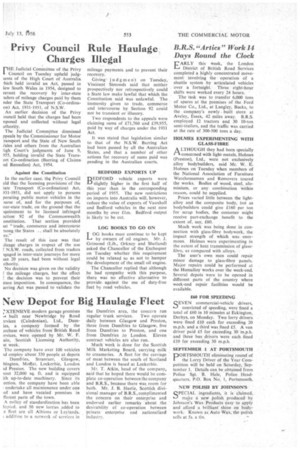Privy Council Rule Haulage Charges Illegal
Page 39

If you've noticed an error in this article please click here to report it so we can fix it.
THE Judicial Committee of the Privy A Council on Tuesday upheld judgtents of the High Court of Australia ,hich held invalid an Act, passed in few South Wales in 1954, designed to revent the recovery by inter-state .aders of mileage charges paid by them rider the State Transport (Co-ordinaon) Act, 1931-1951, of N.S.W.
An earlier decision of the Privy :ouncil held that the charges had been nposed and collected without legal uthority.
The Judicial Committee dismissed ppeals by the Commissioner for Motor 'ransport and the State of New South /ales and others from the Australian ligh Court's judgments of June 9, 955, holding invalid the State Transort Co-ordination (Barring of Claims rid Remedies) Act, 1954.
Against the Constitution
In the earlier case, the Privy Council eld that the licensing provisions of the tate Transport (Co-ordination) Act, ;31-1951, did not apply to persons perating public motor vehicles in the 3urse of, and for the purposes of, iter-state trade, on the ground that the iquirement to be licensed infringed ection. 92 of the Commonwealth onstitution. That section provided tat "trade, commerce and intercourse mong the States .. shall be absolutely ve."
The result of this Case was that tileage charges in respect of the use N.S.W. roads, collected from traders agaged in inter-state journeys for more Ian 20 years, had been without legal athority.
No decision was given on the validity f the mileage charges, but the effect E the decision was to prevent their [lure imposition. In consequence, the arring Act was passed to validate the mileage payments and to prevent their recovery.
Giving judgment on Tuesday, Viscount Simonds said that neither prospectively nor retrospectively could a State law make lawful that which the Constitution said was unlawful. The immunity given to trade, commerce and intercourse by Section 92 could not be transient or illusory.
Two respondents to the appeals were claiming sums of £71,760 and £39,955, paid by way of charges under the 1931 Act.
It was stated that legislation similar to that of the N.S.W. Barring Act had been passed by all the Australian States, and that a number of other actions for recovery of sums paid was pending in the Australian courts.
BEDFORD EXPORTS UP
BEDFORD vehicle exports were slightly higher in the first half of this year than in the corresponding period of 1955. The new restrictions on imports into Australia will, however, reduce the value of exports of Vauxhall and Bedford vehicles in the next nine months by over £1m. Bedford output is likely to be cut.
LOG BOOKS TO GO ON OG books must continue to be kept by owners of oil engines. Mr. J. Grimond (Lib., Orkney and Shetland) asked the Chancellor of the Exchequer on Tuesday whether this requirement could be relaxed so as not to hamper the development of the small oil engine.
The Chancellor replied that although he had sympathy with this purpose, there was no effective alternative to provide against the use of duty-free fuel by road vehicles.












































































































